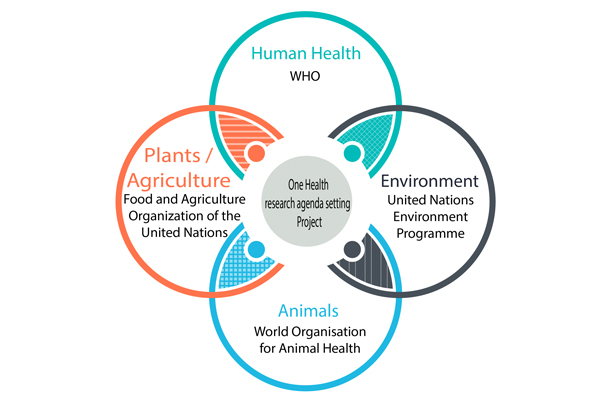Setting the One Health research agenda for antimicrobial resistance
The rapid global spread of “superbugs” causing infections not treatable with existing antimicrobial medicines such as antibiotics is alarming. The first comprehensive analysis of the global impact of antimicrobial resistance (AMR), estimated it caused 1.27 million deaths in 2019, and antimicrobial-resistant infections played a role in 4.95 million deaths. As comparison, global death rate for COVID19 over the last 2 years is estimated at 5.6million.
AMR, where diseases caused by bacteria, fungus, or viruses become harder to treat because the antimicrobials used to treat them become less effective, is now one of the biggest threats to global health. The prescription of incorrect doses, self-medication and treatment of non-bacterial illness of antibiotics in animal and human healthcare and crop production as well as pollution across the pharmaceutical supply chain is accelerating the risk.
The cost of AMR to national economies and their health systems is significant – with harder-to-treat illnesses; animal medicines and crop treatments becoming less effective thereby reducing food production, and widespread AM pollution exacerbating the biodiversity crisis.
It is essential to clearly understand how resistance disseminates between humans, animals, plants, waters, soils, and the air meaning that multisectoral surveillance and response is needed. This One Health approach holistically considers the health and wellbeing of humans, animals, plants and crops, and our wider environment.

Since 2015, the World Health Organization (WHO) has worked to the Global Action Plan (GAP) on Antimicrobial Resistance that uses the One Health approach. WHO Geneva has appointed Nossal Institute for Global Health to develop a One Health research agenda to identify 50 research activities that most significantly reduce AMR at the intersection of each One Health sector, thereby ensuring that scarce research capacity and investment results in maximum impact.
Nossal Institute will be collaborating with key experts from The Doherty Institute, National Centre for Antimicrobial Stewardship; School of BioSciences; OUTBREAK consortium and the School of Population and Global Health, University of Melbourne on this multidisciplinary project.
A report of the One Health Priority Research Agenda is expected to be completed late 2022